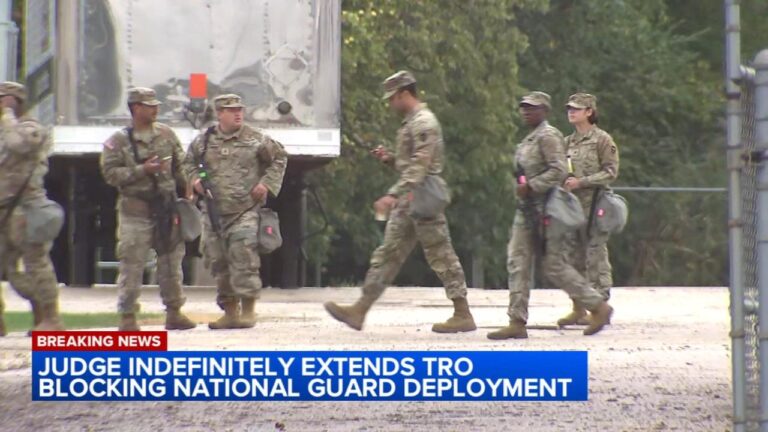October 23, 2025: National Guard Deployment Amidst Widespread Immigration Enforcement Actions
On October 23, 2025, a pivotal day marked by extensive immigration enforcement, the National Guard was activated to assist federal agencies in multiple states. This coordinated effort has ignited national discourse on immigration policy, civil liberties, and public safety. Drawing from on-the-ground CNN reports and official statements, this article delves into the operational details, community impact, and broader implications of these events.
Activation of National Guard Units to Bolster Immigration Enforcement
In a decisive step, state officials authorized the deployment of National Guard forces to support federal immigration operations scheduled for October 23, 2025. This mobilization aims to reinforce border security measures and ensure compliance with immigration laws through a multi-state collaborative approach. Approximately 1,200 Guardsmen from various brigades have been assigned roles ranging from logistical support to perimeter security.
- Operation Coordination: Joint efforts with ICE and Customs and Border Protection (CBP)
- Timeframe: Deployment spans several weeks around the operation date
- Personnel Involved: Around 1,200 National Guard members activated
- Primary Duties: Transportation assistance, communication facilitation, and securing operational zones
| Unit | State | Assigned Role |
|---|---|---|
| 1st Infantry Brigade | Texas | Area patrol and perimeter security |
| 3rd Aviation Battalion | Arizona | Aerial reconnaissance and personnel transport |
| 5th Support Battalion | California | Logistical coordination and communications |
Comprehensive Overview of Immigration Raids Across Six States
Federal agencies have escalated immigration enforcement efforts in six states, focusing on individuals with unresolved removal orders and those with criminal backgrounds. These operations, led by U.S. Immigration and Customs Enforcement (ICE), are being executed simultaneously in both metropolitan and rural areas. The involvement of local law enforcement varies, prompting discussions about jurisdiction and civil rights protections. Authorities stress the priority of mitigating public safety threats, while opponents caution against potential civil liberties infringements and community destabilization.
- Deployment of over 1,200 ICE agents and support staff nationwide
- Temporary detention centers established to handle increased detainee numbers
- Enhanced collaboration with National Guard units for operational support
- Utilization of sophisticated data analytics to pinpoint high-risk individuals
| State | Individuals Targeted | Local Law Enforcement Participation |
|---|---|---|
| Texas | 450 | Extensive |
| Arizona | 300 | Moderate |
| Georgia | 200 | Minimal |
| Florida | 150 | Moderate |
Community Repercussions and Advocacy Group Reactions
The deployment of the National Guard alongside immigration raids has generated significant anxiety and disruption within affected neighborhoods. Many local businesses have temporarily shut down, and families face the distressing prospect of separation. Residents report a pervasive atmosphere of unease, with everyday routines overshadowed by concerns over enforcement activities. Educational institutions and community organizations are intensifying efforts to provide emotional support and resources, yet the strain on mental health and social unity remains evident.
Civil rights advocates have vocally opposed the operations, demanding transparency and accountability. Organizations such as the American Civil Liberties Union (ACLU), National Immigration Law Center (NILC), and the NAACP have mobilized legal assistance and organized peaceful demonstrations nationwide. Their key demands include:
- Halting further raids pending a thorough policy review
- Implementing safeguards against racial profiling and wrongful detentions
- Increasing oversight of National Guard involvement in civilian law enforcement
| Organization | Initiatives | Focus Area |
|---|---|---|
| ACLU | Legal defense and public education campaigns | Protection of civil liberties |
| NILC | Immigration case support and legislative advocacy | Immigrant rights |
| NAACP | Community engagement and anti-discrimination efforts | Racial equity |
The unified response from these groups underscores the ongoing tension between ensuring national security and safeguarding individual freedoms, highlighting the urgent need for constructive dialogue and reform.
Guidance on Accessing Legal and Social Assistance During Enforcement Actions
During periods of intensified immigration enforcement, such as the recent National Guard-supported raids, it is crucial for affected individuals to be aware of available legal and social support systems. Connecting with local legal aid organizations specializing in immigration law can provide essential assistance, often free of charge. Community centers and nonprofit agencies also offer vital services, including housing support, healthcare, and food aid. Preparing necessary documents—such as identification, residency proof, and any official notices—can facilitate smoother access to these resources.
Staying informed about one’s rights and protections is equally important. The following table lists key organizations and the services they provide to help individuals navigate this challenging environment:
| Support Category | Contact Organization | Services Provided |
|---|---|---|
| Legal Assistance | National Immigrant Justice Center | Pro bono legal representation and consultations |
| Social Support | Local Community Resource Centers | Housing, medical care, and food programs |
| Know Your Rights | ACLU Immigration Project | Rights education, workshops, and hotline services |
- Maintain a list of emergency contacts accessible at all times
- Keep detailed records of all interactions with law enforcement and support agencies
- Participate in community forums to stay informed about local developments and resources



